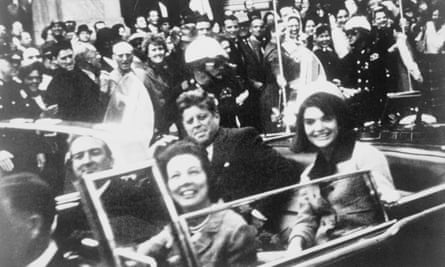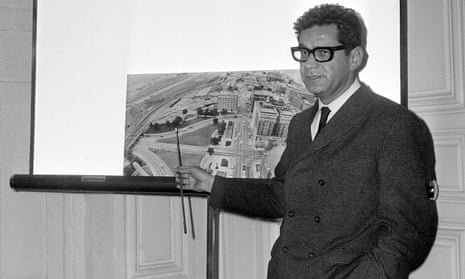The assassination of President John F Kennedy in Dallas on 22 November 1963 remains a subject of contention and dispute more than half a century later. The lawyer Mark Lane, who has died aged 89, was at the centre of that dispute almost immediately after the killing, and remained there, often controversially, for almost all that time. His 1966 book, Rush to Judgment, an indictment of the Warren Commission’s finding that Lee Harvey Oswald was Kennedy’s lone, crazed assassin, became the first bestselling book to suggest an untold story to the killing.
Lane was an indefatigable researcher and a relentless self-promoter, and his activism and pursuit of conspiracy exposed him to much criticism. He was often accused of sensationalism and hyperbole, which could obscure the most valuable parts of his work; his career might stand as a metaphor for the chaotic web that surrounds the assassination itself.
Lane was drawn to the assassination after reading early press reports of witnesses contradicting the official version, that assumed Oswald’s guilt. As a lawyer, he realised the evidence was shaky, with no cross-examination on Oswald’s behalf, and he quickly wrote a 10,000-word article, Oswald Innocent? A Lawyer’s Brief.
The only publisher he found was a small, far-left weekly, the National Guardian, based in New York. In Britain, Bertrand Russell followed up with a similar article and formed the Who Killed Kennedy Committee with JB Priestley, Hugh Trevor-Roper and others.
Oswald’s mother, Marguerite, hired Lane to represent her son, but the Warren Commission would not accept him. They did, however, call him to testify. He used his own interviews with witnesses to point out anomalies in their testimonies, but when the Warren Report was published his points were dismissed or ignored.
Like his article, Rush to Judgment had a similar story of rejection before it was published, and then sold 85,000 copies immediately. Lane and the filmmaker Emile De Antonio combined on a documentary based on the book. In 1969, Lane published A Citizen’s Dissent in response to his critics, and he and the screenwriter Donald Freed collaborated on a script adapted from Rush to Judgement, which was rewritten by Dalton Trumbo and became the 1973 film Executive Action.
Lane was already an activist by the time Kennedy died. He was born in Brooklyn, New York, where his father, Henry, was an accountant and his mother, Betty, a secretary. After serving in US Army intelligence in Vienna, after the second world war he studied at Long Island University and took a degree at Brooklyn Law School, first making his name when he exposed mistreatment in a Long Island psychiatric home.
In the late 1950s he helped found a liberal reform faction, backed by Eleanor Roosevelt, within the New York Democratic party, and in 1960, as Kennedy became president, he was elected to the New York State Assembly. He served one term, during which he was arrested during the civil rights Freedom Rides in the south, but he was defeated in the primaries for Congress in 1962.
In 1968 he was the comedian Dick Gregory’s vice-presidential candidate for the Freedom and Peace party, and was one of the celebrities alongside Jane Fonda in the early days of Vietnam Veterans Against the War. He went on to work as a consultant to the New Orleans district attorney Jim Garrison in his investigation of the Kennedy assassination, which became the basis of Oliver Stone’s 1991 film JFK.

Alongside the celebrated lawyer William Kunstler, Lane represented the American Indian Movement activists Russell Means and Dennis Banks, following the 71-day stand-off between federal forces and members of the Oglala Sioux at Wounded Knee (they were eventually acquitted). In 1977 he and Gregory published Code Name “Zorro”, about the assassination of Martin Luther King; that led, eventually, to his representing James Earl Ray, the accused killer, before the US House of Representative Select Committee on Assassinations.
Lane represented Jim Jones and his People’s Temple; he and Freed were investigating Jones’s claim that intelligence agencies were conspiring against him. Lane was in Jonestown, Guyana, but escaped as some 900 Temple members died in a mass suicide, and he went on to write Strongest Poison: How I Survived the Jonestown Guyana Massacre (1979).
Lane’s most unlikely client was Liberty Lobby, a far-right group whose magazine, The Spotlight, claimed that E Howard Hunt, one of the Watergate burglars, had been in Dallas when Kennedy was shot. In 1981 Hunt sued for libel, and Lane was brought in for the 1985 appeal hearing. He produced witnesses who claimed Hunt was in Dallas and won the case – though some jurors apparently voted against Hunt on the grounds that his reputation couldn’t be defamed. On the back of the trial, Lane published Plausible Denial (1991), positing CIA involvement in the assassination.
Lane said his proudest moment came when James Richardson, a black fruit picker, was released from prison in Florida in 1989 after serving 21 years for the murder of his seven children. Lane’s book Arcadia (1970) had argued his innocence, and he had campaigned for two decades to have the case reviewed.
In 2011 Lane returned to Kennedy, publishing The Last Word: My Indictment of the CIA in the Murder of JFK.
His memoir, Citizen Lane (2012), was made into a 2013 documentary. He is survived by his third wife, Tricia, and three daughters.

Comments (…)
Sign in or create your Guardian account to join the discussion